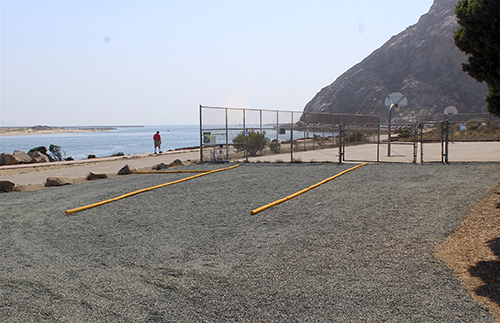The Harbor Department has set up three RV spaces at Coleman Park for overnight camping. Coleman Park is one of three — soon to be four — areas around the waterfront where the City will rent RV and tent camping spaces
Morro Bay is ready to enter the RV park business at the same time it’s raising fines for illegal camping by some 150%.
The City Council on Aug. 18 changed its camping ordinance, Section 8.20.030 of the Municipal Code, increasing fines from the current $62 for a first offense to $250 for camping in a car or an RV anywhere that isn’t specifically designated for such use. And they did it through an emergency ordinance.
A second offense jumps to $500 and a third violation (and each violation thereafter) will garner a $1,000 fine, “for the 12 months after the first violation,” according to a report from the City Attorney, Chris Neumeyer.
Though State law only allows up to $100 fines for “infractions” of muni codes, among other restrictions, switching the fines to an “administrative” offense, equal to doing construction without a permit, has no limits on the fine amounts, according to Neumeyer.
“With the current COVID-19 pandemic,” Neumeyer said, “coupled with increased popularity of traveling via recreational vehicles and trailers, the City has experienced an increase of travelers, camping through their recreational vehicles or other vehicles [“vehicular camping”], unable or unwilling to camp in designated areas.”
The police department ends up dealing with them, which is really a code enforcement issue. “Morro Bay Police Department,” Neumeyer said, “reports that officers will on average contact over 50 unlawful vehicular campers during a weekend night shift.”
Illegal camping in Morro Bay is defined as staying anywhere outside designated camping areas — public campgrounds (State Parks) and private RV parks, of which Morro Bay has six.
Not changing the fines, Neumeyer said, gives people an incentive to illegally camp. “Essentially an unlawful vehicular camper can set up in an illegal camping area, camp for a 48-hour period, and only pay $62, because local law at present requires first a warning be issued; does not allow additional enforcement within a 24-hour period; and the current fine when a first citation is issued is $62 [and can only be increased up to $100 under current law].”
Essentially, the change makes illegal camping a misdemeanor and is also meant to fight environmental impacts too.
Neumeyer said, “Vehicular camping outside of prepared and designated areas creates immediate hazardous conditions for the environment with unlawful disposal of human waste, trash, fuel spills, and vehicle exhaust. The large numbers of vehicular campers who are camping in undesignated areas are also causing visual blight to the natural beauty of Morro Bay, as well as generating a deleterious, unwarranted and negative environmental impact. Morro Bay community members have also voiced concern and displeasure with the large number of vehicular campers who are camping in undesignated areas.”
But rogue RVers will soon have some spaces to legally stay by the bay. Harbor Director Eric Endersby said the department was planning this week to open up some waterfront areas to overnight camping for a handful of RVs, renting them out nightly through the online booking service, “Bonfire.”
Endersby told Estero Bay News last week that they had tried to get the RV spaces open before Labor Day Weekend, but “It will be too crazy,” he said of the massive influx of visitors the City was expecting for the end of summer holiday. “It’s going to be over-the-top crowded.”
The department decided on a soft opening in the middle of this week. There will be three sites where the City will allow RV or tent camping — three spaces adjacent to the basketball court at Coleman Park; nine spaces in an unused maintenance yard near Morro Creek, where Endersby said the Master Baiters used to bait long lines for commercial fishermen; and seven spaces in the “Triangle Lot” (behind the Maritime Museum), for a total of 19.
The Triangle Lot will be open to tent camping too, which Endersby said the Coastal Commission insisted on.
The fees range from $75 a night at Coleman Park to $65 a night at the Triangle Lot and the creek area (see: www.morrobayca.gov/1020/Waterfront-RV-Tent-Camping for information on this program).
The City will also charge its 10% bed tax, 3% for the Tourism Business Improvement District, and 1% for the County Tourism Marketing District, for a total of 14% in taxes or $10.50 a night (at Coleman Park).
These will be dry camping, he said, meaning there are no utility hookups at all. Bathroom facilities would be a single ADA restroom at the Triangle Lot, and port-a-potties at Coleman Park, where the bathrooms are currently condemned and closed. Out by the creek, Endersby said they would have to bring in port-a-potties.
They also plan to eventually have a handful of RV spaces available by the launch ramp for fishermen who want to drive their RVs to town, towing their boats, and stay by the launch ramp.
Rockfish season, the main sport fishery in these waters, is open from April to the end of December. Tidelands Park has the best facilities including men’s and women’s restrooms with coin-op showers.
While Bonfire will handle the RV space rentals, Endersby said they would rent the launch ramp spaces through their parking kiosk, which has also had issues of late.
Installed about 10 years ago, the parking kiosk collects $5 per day for parking a truck and boat trailer while people go out fishing. The system has worked well and the department has collected thousands every year.
But last year it began to unravel. Endersby explained that the company that made and serviced the kiosk sent an email announcing that as of a certain date it would no longer “support” the kiosks, and recommended customers buy a new one at some $15,000.
Trouble was, he said, they emailed to the City’s old email address and no one saw it until a month before the service was to end. The death of the old machine coincided with the close of last rockfish season, and in March, the launch ramp was closed for the coronavirus pandemic response.
It is now open to launch boats and social distancing and mask wearing is required while on shore.
Endersby said they conferred with Pismo Beach, which was in the same situation but for a lot more parking kiosks. They decided to go with a new company that Pismo found and bought a new kiosk for $12,000. It can be programmed to take payments for the RV spaces and they should have that up soon, he said.
When fishing started again in April, Endersby said they used the old “iron ranger” method — a metal drop-box and essentially relying on the honor system — to collect parking fees.
Endersby said they adopted much of Port San Luis’ RV parking program that rents spaces along Avila Drive. PSL uses Bonfire, he said, and the company will handle reservations, collect payments including the taxes, add on a fee for itself, and remit the monies on a schedule, along with an accounting report.
He hopes to have a link put on the City’s home page that would take people directly to the Bonfire site to rent one of the city’s spaces.
Endersby emphasized that this a pilot program that he expects to last through the pandemic and if they want to make it a permanent thing, the City will have to get a coastal development permit from the Coastal Commission.




